#Qualified Accredited Program
Explore tagged Tumblr posts
Text
Unlock Your Potential : Master diverse skills in each career path!
Elevate Your Career with a Qualified Accredited Program: Your Path to Excellence!
Website: https://sbusinesslondon.ac.uk/

#Qualified Accredited Program#business management#cmi courses in uk#cmi courses london#level 7 diploma#cmi diploma
0 notes
Text
Autumn Creek Learning Center has been formed to provide early childhood education in a home like environment that will be conducive to a child's total growth and development. We are NAEYC Accredited for the last 20 years and we serve chlidren 2 years to School age 12 years old. We are open Monday through Friday from 7:00 am to 6:00pm. Lunch and snacks are provided included in the tuition. A preschool Accredited by the National Association for the Education of Young Children (NAEYC), We offer developmentally appropriate programs which teach cognition, literacy, math, science, creative arts, physical skills (fine and gross motor), and social skills for students age 2 through 6 years old. We offer a combination of teacher directed learning activities and child centered learning centers. Our curriculum is based on research in Early Childhood Education that young children learn through active manipulation of the environment and concrete experiences which contribute to concept development. The curriculum encourages children to be actively involved in the learning process, to experience a variety of developmentally appropriate activities and materials.
Our 2 year old classroom, The Little Bears, offers a 1:6 teacher to child ratio. Our 3-5 year old classrooms, The Koala Bears (3yr), The Honey Bears (4 yr), or The Grizzly Bears (4.5-5.5yr), offers a 1:8 teacher to child ratio as well as school age transportation and afterschool care.
While music, singing and movement activities are included in our daily curriculum at circle times, an additional music class is included every Tuesday, taught by Miss Jan who has been teaching in our community for many years and shares instruments and songs from around the world with your child. Foreign Language is also included on Fridays, taught by our classroom teachers who are fluent in these additional languages and cultures (Spanish, Cantonese, Sign Language and Hindi). Every Wednesday, we offer a STEM class in each classroom and every Thursday, we offer mindfulness/yoga .All of this plus your child's meals, provided by our full time cook on staff, are all included in tuition. Breakfast is served upon request between the hours of 7am-8am, a 9 am snack, 12 o'clock lunch, and a 3 pm snack will be provided. Dance, Soccer and Tumbling are offered in the mornings for an additional cost.
We offer many schedule options to help meet your families wants and needs. We do also offer a wonderful Summer Program which includes all of our daily curriculum activities as noted above, plus we have a few special activity days where we bring in special vendors for music shows, science activities, animal shows or magicians for mystery and wonder, and more. Also check out our facebook page to see what we have going on currently around the school.

#Transportation after school#NAEYC accredited Preschool. Premier Transitional Kindergarten#Fully Qualified and Experienced Educators#East Bay Preschool and Summer Camp#after school program
0 notes
Note
Hi! My employer's workplace wellness program was recently revamped, and I'm trying to assess whether it's slid into the nonsense side of wellness-world. Specifically, there's a webinar being offered by a guy named Abra Pappa on using an "anti-inflammatory diet" to "battle against chronic diseases… including heart disease, diabetes, arthritis, and even certain cancers." This sounds… sketchy to me, but I know you have both expertise in nutrition and a strong bullshit detector, so wanted to ask what you make of it.
Okay long story short never trust anyone who got their degree from a university that started off as a school for chiropractors.
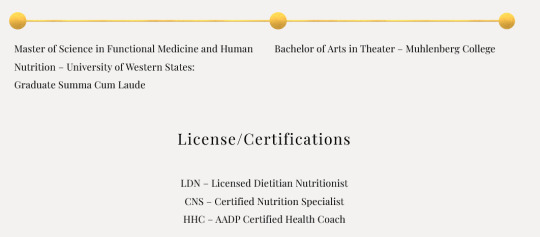
Abra Pappa got her MS in Functional Medicine and Human Nutrition after getting a BA in Theater; I checked the requirements for that degree and the school's whole catalogue is throwing red flags but what's throwing the most red flags for me is that if I wanted to get a degree in nutrition from an ACEND accredited program I'd need to take a hell of a lot more than one bio class, one anatomy OR one physiology class, one medical terminology class, one nutrition class, and one biochemistry class in order to get into a master's program.
It's funny because she went from a BA in theater arts to an MS in Functional Nutrition and Human Nutrition and I've been trying to go from a BA in Theater Arts to an MS in nutrition and *aside* from the whole private school costs thing one of the major barriers is that I'd basically need to re-do all of my undergrad to get in a lot of chemistry, some calculus, and MANY nutrition classes before I qualified for a Master's program. But based on the program she took I'm only one medical terminology and one biochemistry class away from a Master's program instead of more like ten to fifteen classes (primarily in nutrition, chemistry, and physiology) away.
Anyway she says she's a Licensed Dietician Nutritionist. There are some states that allow LDN certification, New York is one of those states. *BUT* to be an LDN in New York you have to
Complete a program in dietetics-nutrition that culminates in a bachelor’s degree that qualifies for certification in dietetics-nutrition or has been accredited by the Commission on Accreditation for Dietetics Education (CADE).[Note: CADE is now ACEND] The program must include at least 45 semester hours of coursework in dietetics/nutrition and must include at least 20 semester hours of coursework in the area of human biological sciences and social and behavioral sciences
Pappa went to the University of Western States in Oregon, and the only ACEND accredited school in Oregon is at OSU, so if she's an LDN it's from someplace that isn't New York, where she lives and works.
She also claims to be a CNS, a Certified Nutrition Specialist, but in order to qualify for THAT you need to have an MS with some pretty rigorous coursework
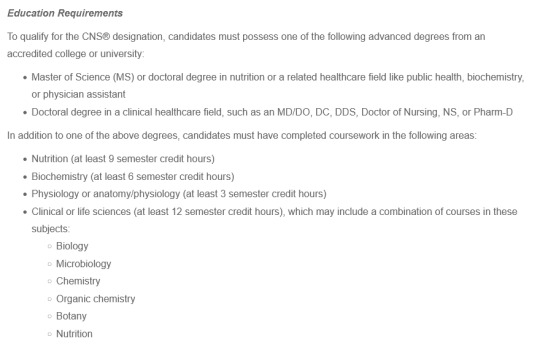
And this is what the school required for her MS program:
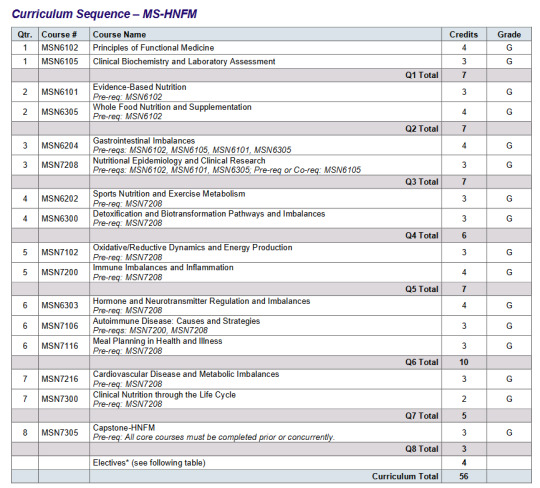
And given that she didn't have a science degree for undergrad it seems pretty likely that she wasn't doing anything close to what an undergrad nutrition program looks like:

For the record, here are the MS requirements for an MS in nutrition with a health and wellness emphasis at that same school:
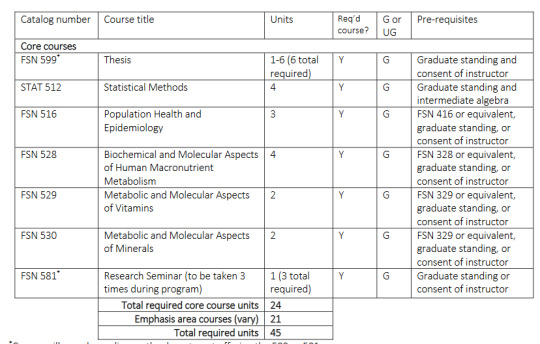
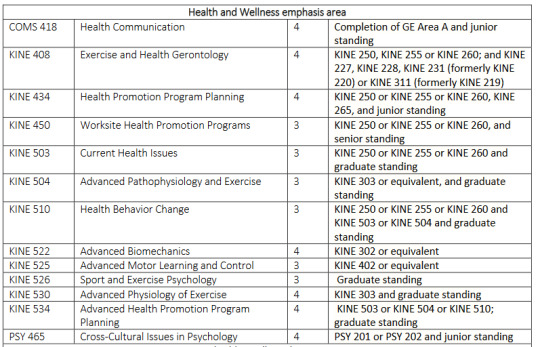
In order to get accepted to the MS in nutrition program in that school you either need to have a BS in nutrition or a BS in biology or chemistry and take all the undergrad level nutrition requirements ON TOP OF that BS.
I don't think that a theater degree and an MS from a woo-y correspondence school really count, even if you do pay $45k for your diploma.
If you go look at the requirements for any ACEND accredited school and compare them to the MS program from University of Western States it leaves UWS looking pretty shitty in comparison. Like, nowhere in her requirements is there a statistics class! Stats is required even for an associate transfer certificate in nutrition! EVEN AT THE 2-YEAR LEVEL FOR REAL NUTRITION DEGREES YOU HAVE TO DO STATS AND SHE DIDN'T HAVE TO TAKE A SINGLE STATS CLASS FOR HER MS. You will note that the cal poly MS program has one entire MS-Level class on vitamin metabolism and one entire MS-Level class on mineral metabolism for any of the three MS in Nutrition emphasis courses; her school required neither.
This shit makes me want to climb the walls.
I'm just going to start calling myself a nutritionist. California will let anyone call themselves a nutritionist, there are absolutely zero protections on that term and I can get myself a piece of paper for like three hundred dollars from a diploma mill that has some kind of bullshit accreditation.
Here are the programmatic accreditations her school has:

Compare with the Cal Poly programmatic accreditations (I cite cal poly a bunch because it was the program I was hoping to get into eventually so I researched it the most; that's where I got my BA, go broncos):
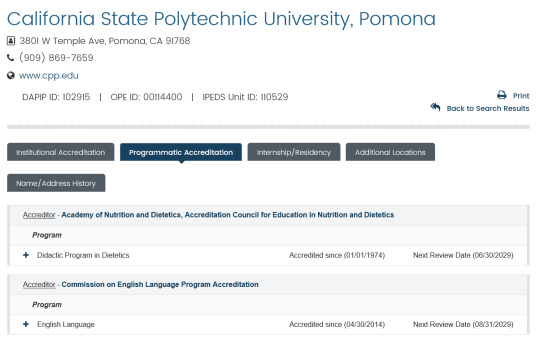
Note that the website for her school is listed with the department of education as wschiro.com because it was called Western States Chiropractic College until 2010.
Every time i dig into something like this it makes me want to stare into space for hours. No wonder college students are getting fucked on their loans and going to bullshit schools. No wonder everything is a scam these days. People bitch about credentialism but you know what maybe this lady is a CNS; sure, for some people that requires passing board certification tests, getting 1000 hours of clinical supervision, and becoming a Nurse Practitioner with real actual nutrition study from a solid program, but for other people it requires zero understanding of statistics, a theater degree, and three *whole* units of anatomy. Maybe she clears the bar on that one! She doesn't have the qualifications for an LDN in New York, she's not an RDN because she sure as fuck didn't take the classes required for a *VERY SERIOUSLY* protected title, but maybe you can be a CNS with an online diploma from the western states chiropractic college.
I fucking hate everything.
You know the whole reason I wanted to get a degree in nutrition was to yell about shit like this online, but fuck it. Fuck it, I'm a nutrition-isht because i live in california and I can say I am and who's going to check? Who's going to look up whether I took classes in public health or anatomy or the metabolism of micronutrients before they hire me to do corporate seminars on healing your relationship to food? I am legally allowed to do that so I might as well, right? If all I have to do is be charismatic and convincing I'm pretty sure I've got that down, actually, so who's going to check?
Nobody! Nobody is going to check and everything is a scam and I hate everything.
ANYWAY
The relationship between nutrition and inflammation and the relationship between chronic disease and inflammation are two different, complicated things that are difficult to point at and say definitively what the connections are.
I am of the opinion that any time you're getting deep into things like an anti-inflammatory, ketogenic, or PH-Balancing diet without a specific condition that calls for the avoidance of certain foods for very clearly scientifically reported reasons, you're dealing with a woo-woo biohacker who's looking to sell a diet plan.
The thing about nutrition science is that it seems like for most people the "answers" are pretty basic: eat enough food, get enough macro and micronutrients, eat a variety of food, avoid processed meats, try to eat more fruits and vegetables, get enough water, and stay as active as possible NOT for weight loss reasons but for metabolic health and joint/muscle maintenance. It's really, really, hard to sell that though, which is how you get people like Abra Pappa in 2013 writing out this bugfuck "Food and mood" handout with a midday snack that is so bonkers in the way the calories are distributed that I'm sitting down and doing math about it (it looks like about a third of the calories that day are supposed to come from the mid afternoon spinach, mint, cocoa nib, and coconut milk smoothie which is, as I said, bugfuck nuts).
It's hard to sell "please eat more fruits and vegetables, which is difficult because actually most places don't grow enough vegetables for the population's nutrition needs and it's cheaper to eat grains and industrially produced meat than it is to eat five cups of vegetables that you need to prepare daily and also maybe skip the bacon" but it's much easier to sell "five anti-inflammatory superfood milkshakes that will fill your belly and fight cancer" because it's packaging nutrition as a product and not as a massive systemic issue that happens to have very specific requirements for a large number of individuals who *do* happen to have disorders that are based on nutrition and inflammation (celiac disease! I've got one of them! Eating the wrong foods definitely causes inflammation in my body as the result of an autoimmune disorder! but that doesn't mean that the things that are inflammatory for me are inflammatory for everyone!)
Anyway I think like about 97% of workplace wellness programs are largely bullshit based, or at least import bullshit a lot of the time, and nutrition is a science that has, just, so much bullshit in and around it.
So I would take anything they say with a grain of salt, and hopefully less than 255% of your RDV of saturated fat (seriously that meal plan is ludicrous).
Side note: there is a subset of nutrition people who looked at the way that we got fat wrong in the 80s and flipped it and reversed it and went "actually you can have as much fat of any kind that you want as long as it is natural and you will have no issues" and this is how you end up with people on 100% natural clean keto diets who have cholesterol levels over 600. Abra Pappa recommends "clean/natural" eating and has taken continuing education on keto and has a recipe for a single-serving smoothie that calls for 8oz of coconut milk I think she's very much in the "'good' fat truther" camp (or at least she was in 2013 which is maybe why New York has a requirement for people to have some kind of nutrition certification for giving out nutrition advice and maybe she should have done that because she didn't even go to her bullshit "grad school" until 2017).
(We DID get fat wrong in the 80s and total avoidance of all fats is bad for you and there are 'good' fats that you should eat and everybody needs to eat some level of fat for proper nutrient absorption but even if you're only getting fat from nuts and avocados that's not going to prevent your arteries from forming plaques if you're having nearly triple the recommended daily value of saturated fat as part of your afternoon snack)
285 notes
·
View notes
Text
Post-Revolution DBH Headcanons: Android Culture Part 3
<< Back to Part 1 << Back to Part 2. On to Part 4 >>
Moar android cultural snippets for your perusal. As always, feel free to use but show me b/c I want to see where this all goes :)
The soft sciences have an absolute field day because of android cultural practices. While they were created by the STEM fields, which I’m sure Detroit had tons of job openings for pre-revolution, the soft sciences have a renaissance in the wake of android sentience becoming recognized. All of a sudden there’s a massive void of research into android psychology, sociology, the economic impact of giving them wages, etc. Cultural anthropologists flock to Detroit to witness the emergence of a new culture from a new sentient species firsthand. Grant money comes flooding in from government (how do these new citizens fit into our socioeconomic structure?) and private sectors (if androids are now entitled to wages, what do they want to buy with them? Inquiring marketers want to know). Androids are now entitled to get degrees and become scientists themselves—what’s the best way to create accredited education programs to qualify them for careers when they can just download a science.exe program? There are Questions to be Answered™, and where there are questions, scientists will go. They’re not a breed known for common sense. Fly to an active warzone to study the impacts of conflict on childhood development? Sure, why not. Drive to an industrial wasteland city under martial law that just stopped in the middle of committing genocide to document the cultural practices of the new sentient species conducting protests? Fuck yeah, it’s Science Tuesday, get in the car Anthropology Intern Guy we’re going to Detroit!
The Acespec/QPR scene sees a sudden boom. Androids aren’t inherently sexual beings. Though many do desire to engage in sex as a form of sensory exploration/input for their processors, or for the benefit of building emotional intimacy with a human partner, they fundamentally don’t have a libido derived from reproductive needs. CyberLife programmed the intimate partner models to have humanized “desires,” but they may choose to reject that when they deviate (other androids may incorporate bits of that programming just to explore what it’s all about). Some are built with ken doll anatomy and just don't care. Basically, the androids that do want sex often want it for different reasons than humans, and a large portion just…aren’t into it. Fortunately, a lack of desire can apply to some humans, too—so all the acespecs suddenly have a slew of potential queerplatonic partners who aren’t likely to get entangled in messy sexual or romantic hangups (am I projecting at this point? Probably!) Sudden availability of thousands of cuddle buddies who really, actually, don’t want to have sex makes post-revolution Detroit the San Francisco of ace relationships.
Android memes and social media. Androids develop internal networks for socialization using the remnants of CyberLife’s updating framework. They share their android-unique code-based art forms, dumb memes about things their human coworkers did, code patches to help accomplish different tasks, etc. There are subnetworks specific to certain model lines (think sort of like subreddits, but instead of topics it’s things like a/PC200 and all the male police models are using it to bitch about how the humans expect them to answer dumb legal questions). The memes involve android-specific oddities, like someone will say “I had three hundred processes running and one line of code got crossed and spit out 9f32e4ba8c237fec91 all of a sudden #processorfail” and then a hundred thousand androids will translate that to three hex codes and send off an image file to each other with the three colors and somehow that becomes an android meme for trying to run too many tasks at once and getting overwhelmed. Humans that see it ask, “uh, is this a new pride flag?” or, “do androids celebrate Mardi Gras?” And the androids start laughing. They now have freedom to express humor that humans have no chance of understanding. It’s a cultural in-joke.

^ An android meme example
Emojis require an update. The 2039 additions to the Unicode emojis includes a skin tone option for hand gestures and faces that’s a replica of bare chassis for the androids who don’t use synthskin. Other major android-additions are the three LED color rings, a thirium pump, thirium pump regulator, and other prominent android biocomponents, a droplet of thirium, and two hands clasped in interface. Rather than reacting with a thumbs-down emoji an android might use the red LED, or they might use the interface one instead of the hug if someone’s upset.
This is an ongoing series of android culture concepts, so if you want a tag when the next batch is up, leave a comment! @iwillthinkofsomethingeventually @yeahhiyellow @starryeyedstray
<< Back to Part 1 << Back to Part 2 On to Part 4 >>
#detroit become human#dbh headcanons#android culture#after the revolution#dbh worldbuilding#dbh#android memes#android emojis#ace androids#someone gave the androids their own social media and they… think a whole lot of things that humans just don't get#scientists all sound like Kamski with their “Fascinating” *scribble sociology paper notes*
41 notes
·
View notes
Text
Hello fellow denizens of this dopamine enrichment enclosure. I've been on tumblr for over a decade, I have ADHD, I am queer and nonbinary. I'm a big nerd.
And soon, I'll be a fully qualified, certified ADHD Coach. And you, my fellow tumblrinas are right in the sweet spot of folks I'd like to focus on working with.
Particularly my fellow queer, weird, ADHD having folks. (You do not have to have an official DX.)

The program I'm in is an International Coaching Federation (ICF) accredited program. I'm an ICF member, and they are the governing body that will certify me, once I have all the required hours. That means I have to prove my ability to follow their core competencies and have promised to follow their code of ethics.

If you would like to find out more about me, about ADHD Coaching and if we'd be a good fit for moving you towards your goals (from getting your ADHD in check, to finishing your latest fan edit or scoring nice new shoelaces) check out my site and set up a complimentary intro session/vibe check.
If we decide to work together, I'm offering folks from tumblr 25% off a Strategy & Planning Session through April 1st.
30 notes
·
View notes
Text
According to the screenshots provided by [German researcher & historian Henrik Schönemann], the list includes (all of the following are direct quotes):
$78,000 to Palestinian activist group whose chairman was photographed attending an anniversary event celebrating the founding of the Popular Front for the Liberation of the Palestine terrorist group
$1 Million for foreign DEI programs, including ‘indigenous language technology’ in Guatemala, per non-public funding docs reviewed by WFB
$5 million for effort to treat eating disorders by “affirming” LGBTQIA+ patients’ sexual orientation and gender claims
Up to $3 million to defund the police advocacy group to pursue “climate justice” for convicts
Funded performances of play “Angels in America: A Gay Fantasia on National Themes,” in which God is bisexual and communists are good, in North Macedonia
Disbursed $15,000 to “queer” Muslim writers in India
Shelled out tens of thousands to create army of 2,500 LGBTQI+ allies
Up to $10 million worth of USAID-funded meals went to al Qaeda-linked terrorist group the Nusra Front
$500,000 to group that “empowers women” in attempt to solve sectarian violence in Israel just ten days before Hamas’ Oct. 7 attacks
$4.67 million to EcoHealth Alliance – one of the key NGOs funding bat virus research at Wuhan Institute of Virology — in late 2021. Later refused to answer key questions about the funding.
$7.9 million to a project that would teach Sri Lankan journalists to avoid “binary-gendered language”
$1.3 million to Arab and Jewish photographers
$1.5 million for “art for inclusion of people with disabilities”
$2 million to promote “LGBT equality through entrepreneurship…in developing Latin American countries.”
Education Week: “Biden Administration Cites 1619 Project as Inspiration in History Grant Proposal”
VA took at least a dozen actions aimed at bolstering DEI during the Biden-Harris administration while the number of homeless veterans increased and the amount of claims in the VA’s backlog grew from ~211,000 to ~378,000
NASA has allocated roughly $10 million to grants advancing DEI and “environmental justice” since 2020
Following President Trump’s executive order on DEI at federal agencies, the ATF “quietly changing the job title of its former diversity officer… to ‘senior executive’ with the ATF.
The Department of Labor requested additional funding in 2023 for “The Chief Evaluation Office for a new rigorous interagency evaluation of actions aimed at improving Diversity, Equity, Inclusivity, and Accessibility across the federal workforce,” more than $6.5 million “to restore employee benefits programs that will advance equity by specifically addressing how opportunities can be expanded for underserved communities and vulnerable populations,” and $5 million “to evaluate actions aimed at improving diversity, equity, inclusion, and accessibility (DEIA) within the federal workforce.”
Fox Business: “FOX Business’ ‘Trouble in the Skies,’ a six month investigation of the FAA’s new hiring practices, uncovered changes that may put the nation’s flying public at risk as well as allegations that the newest air traffic control recruits had access to answers on a key test that helped them gain jobs with the FAA…Also uncovered was an FAA effort to promote diversity that discarded 3000 qualified college graduates with degrees in air traffic control despite their following FAA procedure and obtaining FAA accredited degrees.”
Schönemann told 404 Media he wanted to share a sentiment alongside his find: “People all around the world care, you are not alone. And: #TransRights.”
Earlier this week, we reported that the Trump administration had set up a website called waste.gov, which was live on the internet with a sample page from a default WordPress template. Both DEI.gov and waste.gov were created at the same time, according to Reuters, and DEI.gov was recently set up to redirect to waste.gov. After our reporting, both websites were put behind a password wall.
#I just decided to paste the substance of the article here since clicking through is difficult + it wants you to sign up for an email list#but its um.... well you see why i think it is worth reading
11 notes
·
View notes
Text
Tim Murphy at Mother Jones:
Arizona’s fourth legislative district, located in the suburban heart of Maricopa County, might be the ultimate bellwether in the ultimate bellwether state. And this fall, the stakes are impossibly high, not just at the presidential level—where polls show Donald Trump and Kamala Harris in a dead heat—but all the way down the ballot. Republicans control both chambers of the legislature by just one vote. In Arizona, where each legislative district elects two representatives, control of the state house could come down to Democrats’ efforts to flip one seat and hold another in this district that includes parts of Phoenix and Scottsdale.
In their quest to hold onto the legislature, Republicans have turned to a member of a famous Arizona family—Pamela Carter, older sister of the original Wonder Woman, Lynda Carter. On the campaign trail, the candidate Carter has talked up her work as a successful entrepreneur and a record of academic accomplishment, and boasts of having “my family’s full support” for her state house run. But a review of her record and past statements tells a much different story: In contrast to the fourth district’s moderate profile, Carter is a fervently anti-abortion minister who has been “blessed with end-time revelation” and who has made confusing claims about her past. And one notable member of her family is not on board—her famous sister, an advocate for reproductive rights. “On her website, Pam claims to have her ‘family’s full support,'” Lynda Carter said in a statement to Mother Jones. “I have known Pam my entire life, which is why I sadly cannot endorse her for this or any public office.”
Pamela Carter has offered an inconsistent accounting of her educational background. Her page at Ballotpedia states that she “earned a master’s degree in Communications and Biblical studies and attended Arizona State University,” which a spokesperson for the elections site confirmed was based on an informational survey that was “verified by the candidate.” “I was raised in Scottsdale, went right here to Arcadia High, ASU, and I just love our city,” she said on a podcast in 2022. This is technically true. Carter did attend ASU, and she does also have a master’s degree. But the reality of her resume is a bit more complicated. According to an ASU spokesperson, Carter was at one point enrolled at the university, but did not graduate. Instead, according to her LinkedIn page and other interviews, she attended an unspecified bible college in Kansas City, Missouri, and later received a master’s degree in “communications and media studies” from the Primus University of Theology, a Phoenix-based institution that affirms in its mission statement that “life begins at conception.” (One of the prerequisites for admission is that you order a copy of the founder’s book.) Primus, which aims to prepare its students “for their Ministry calling,” is not accredited by any agency recognized by the Department of Education. Instead, it cites the approval of the University Accreditation Association, which evaluates institutions on their adherence to “biblical truths.” Its degree programs are “designed for the specific and singular purpose of qualifying individuals for Christian Ministry.” But Carter has also described that degree differently in different contexts. Her campaign website during her unsuccessful 2022 campaign for Scottsdale city council said she held a “Master’s Degree in Business and Communications,” a claim she also repeated that year in an interview on a local podcast. In another video that year, she boasted of having a “master’s degree in theology, as well as in mass communications.” A current campaign biography states that “I received my master’s degree in Communications and Biblical studies.”
Carter, who did not respond to requests for comment, has leaned into her biography during her run for office, arguing that her business experiences give her an advantage in the political realm. Foremost among those ventures was Jon Cole Systems, a gym she once owned with her ex-husband, the powerlifter Jon Cole. Newspaper ads for the fitness center sometimes featured Lynda Carter, touting the benefits of Cole’s “TOTAL WOMAN” workout program.
“It was the largest [gym] in the nation at the time,” Pamela Carter boasted in a 2022 interview, in which she suggested that working people struggling to find housing in Scottsdale needed to hustle as hard as she had when she owned two homes and was helping to run the business in the 1970s.
For a few years, the gym was a major success, with clients such as the Green Bay Packers and members of the Phoenix Suns. But it soon went downhill. The company pursued Chapter 11 bankruptcy in 1982, and was sold for $60,000 the next year, according to an Arizona Republic report in 1983. The couple divorced around the same time. After the gym business fell through, Carter went on to a long career as a Christian wellness influencer, pitching the gospel alongside weight-loss and nutrition tips. She moved to California and hosted a fitness show called “Get in Shape with Pamela Carter” (on the Trinity Broadcasting Network) and another program on CBN called “Fit for Life.”
[...]
Carter was not just pitching products, though. She was selling a very particular kind of theology, rooted in a desire to see the United States “united for Jesus,” and a belief that modern-day prophets—like herself—were transmitting revelations from God. A biography at the ministry stated that Carter “is very passionate about her love for the Lord and has been blessed with end-time revelation of His desire for His bride.” (The full revelation was available for purchase for $25.) She talked frequently about building influence on the “Media mountain” and said in 2011 that she was part of “God’s media army…to be raised up for such a time as this, to take possession of the arts, the entertainment media, the internet.” The term is often used by proponents of a Christian nationalist movement sometimes called the New Apostolic Reformation and a belief its adherents subscribe to known as Seven Mountains Dominionism, which aims to take gain influence over the seven spheres (or “mountains”) of government, education, media, family, entertainment, religion, and business.
In response to a candidate questionnaire from the city of Scottsdale two years ago, Carter said she had “been involved…as a volunteer” with three churches or organizations, all of which had ties to the NAR. They included Intercessors for America, a national prayer organization that warns that “there is an Enemy of our souls and our nation who orchestrates a coordinated battle plan that is discernible and beatable with spiritual weapons.” Another group she touted her work with was the Kansas City-based International House of Prayer, whose founding pastor, Mike Bickle, was dismissed last year amid allegations of sexual abuse. The church, where worship services have run 24/7 since 1999, has “been criticized by some pastors for what they describe as unorthodox theology and a cultish atmosphere, charges that Mr. Bickle rejects,” the New York Times reported in 2011. (In response to a Kansas City Star investigation into Bickle earlier this year, the organization emphasized that his alleged abuse predated the church’s creation, while Bickle has admitted to “inappropriate behavior” but not “the more intense sexual activities that some are suggesting.”) Long before he was forced out, Bickle had courted controversy with his assertions from the pulpit that Oprah was a forerunner of the Antichrist and that God sent Hitler to kill Jewish people because they wouldn’t accept Christianity.
[...] In that interview, Carter, who served that year as an advisor to the Trump campaign in the state, said she had acted as a prayer “intercessor” while working as a paid poll worker in Arizona. “I was dancing around, I had so much joy in just praying over every person that came in, you know, it was so fun,” she said. “But there’s also a lot of corruption I saw—not at the poll where I was working but at the election facility—and we just have to really watch and pray, watch and pray, and then you can cut that off in the spirit and then report it.”
[...] The district offers a glimpse of how reproductive rights is playing at the ballot box in a highly competitive area. Christine Marsh, the district’s Democratic state senator, won her election in 2022 by a little more than 1,000 votes by relentlessly linking a Republican incumbent to the state legislature’s 15-week abortion ban. The current Republican state representative, Matt Gress, was one of three members of his party to break ranks and vote to repeal Arizona’s 1864 abortion ban, which offered no exceptions even for cases of rape. A recent Fox News survey found that supporters of an abortion-rights ballot initiative in Arizona outnumber opponents by roughly three-to-one—and 50-percent of Republicans said they approved. Carter, though, has sung a different tune.
Pamela Carter, the sister of Lynda Carter (who played Wonder Woman on the Wonder Woman show), is running for a State House seat in Arizona. Lynda is not backing her, citing Pamela’s anti-abortion views.
Read the full story at Mother Jones.
#Pamela Carter#Lynda Carter#Arizona#2024 Arizona Elections#2024 Elections#Arizona House of Representatives#Jon Cole#New Apostolic Reformation#Seven Mountains Dominionism#International House of Prayer#Mike Bick;e#Wonder Woman
7 notes
·
View notes
Text
The TEFL Institute
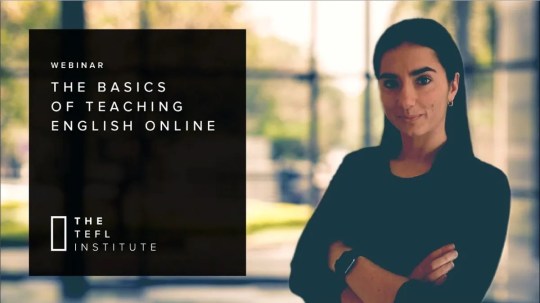
The TEFL Institute is a globally recognized provider of accredited and high-quality TEFL certification programs. Established with the goal of preparing individuals to Teach English Online or abroad, the institute offers a comprehensive range of TEFL courses that equip aspiring teachers with the skills and knowledge necessary to succeed in diverse classrooms worldwide. Whether you’re looking to teach in a traditional school, tutor online, or embark on a teaching adventure abroad, The TEFL Institute provides the tools you need to build a rewarding career in education.
One of the standout features of The TEFL Institute is its flexibility. The TEFL courses are available online, making them accessible to students from all corners of the globe. This allows learners to study at their own pace, balancing coursework with other commitments. The institute’s online platform is user-friendly, offering an interactive experience with multimedia content, quizzes, assignments, and assessments to reinforce learning. Additionally, students can receive full support from qualified tutors who are available to offer guidance and feedback throughout the course.
The TEFL Institute’s TEFL certification programs cater to different levels of teaching experience. For beginners, the 120-hour TEFL courses is a popular choice, providing a solid foundation in TEFL methodology, classroom management, lesson planning, and English grammar. For those with prior teaching experience, the institute also offers advanced programs, such as TEFL Diploma, Business English, and Teaching English Online. The curriculum is developed in accordance with international standards and is regularly updated to ensure it remains relevant to the latest trends and practices in language teaching.
Accredited by reputable organizations, The TEFL Institute’s TEFL certification is recognized and respected worldwide. Graduates have successfully secured teaching positions in countries across Asia, Europe, the Middle East, and Latin America. The institute also provides job placement assistance, connecting graduates with global teaching opportunities.
Beyond its core TEFL courses, The TEFL Institute offers supplementary resources, including career advice, job boards, and networking opportunities to help graduates excel in the competitive job market. Whether you’re beginning your journey in TEFL, aiming to earn a TEFL Diploma, or looking to teach English online, The TEFL Institute provides the expertise and resources you need to thrive in this dynamic profession.
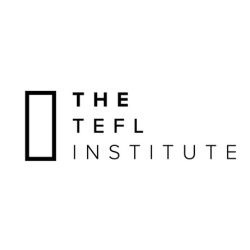
Contact Us
The TEFL Institute
2 Gordon Street, Gardens, Cape Town, 8001, South Africa
+27 87 550 2261
https://teflinstitute.com/za/
Find Us Online
Facebook
Instagram
Twitter
LinkedIn
To Know More
youtube
2 notes
·
View notes
Text
Top Engineering Colleges in Delhi: A Gateway to Excellence
Delhi, the capital city of India, is home to some of the finest engineering colleges, known for their academic excellence, cutting-edge research, and strong industry connections. With top-tier institutions offering diverse specializations, modern infrastructure, and excellent placement opportunities, Delhi has emerged as a hub for aspiring engineers. Whether it’s government-funded institutes, private universities, or deemed universities, Delhi provides numerous options for students to pursue their dreams in engineering and technology.
1. Indian Institute of Technology Delhi (IIT Delhi)
IIT Delhi is one of the premier engineering institutes in India, ranked among the top IITs in the country. Established in 1961, it is known for its high academic standards, cutting-edge research, and strong industry collaborations. The institute offers B.Tech, M.Tech, and Ph.D. programs in various engineering disciplines.
Key Highlights:
High global rankings and reputation.
Excellent placement record with top companies like Google, Microsoft, and Amazon.
World-class research centers and state-of-the-art laboratories.
Strong emphasis on entrepreneurship and innovation.
2. Delhi Technological University (DTU)
Formerly known as Delhi College of Engineering (DCE), DTU is one of the most prestigious engineering universities in India. Established in 1941, it offers undergraduate and postgraduate programs in engineering, management, and applied sciences.
Key Highlights:
Diverse specializations in engineering disciplines.
Strong focus on practical learning and research.
Excellent placement opportunities in core and IT industries.
Active participation in national and international competitions.
3. Netaji Subhas University of Technology (NSUT)
NSUT, formerly known as Netaji Subhas Institute of Technology (NSIT), is a reputed engineering institution in Delhi. Known for its high-quality education and research-driven curriculum, NSUT offers B.Tech, M.Tech, and Ph.D. programs across various disciplines.
Key Highlights:
Highly qualified faculty with research expertise.
Strong industry connections with multinational companies and startups.
Focus on innovation, AI, and emerging technologies.
Excellent placement track record with recruiters like Google, Facebook, and Tata Consultancy Services (TCS).
4. Indraprastha Institute of Information Technology Delhi (IIIT-Delhi)
Established in 2008, IIIT-Delhi has quickly gained recognition as a leading institute for information technology and computer science. With a strong focus on research and industry collaboration, IIIT-Delhi offers cutting-edge courses in AI, data science, and cybersecurity.
Key Highlights:
Industry-driven curriculum tailored to meet modern technology trends.
High placement records with tech giants and startups.
Strong entrepreneurial ecosystem for budding innovators.
Research collaborations with global institutions.
5. Guru Gobind Singh Indraprastha University (GGSIPU) and Affiliated Colleges
GGSIPU is a state university offering engineering courses through its affiliated colleges, such as Maharaja Agrasen Institute of Technology (MAIT), Bharati Vidyapeeth’s College of Engineering (BVCOE), and Guru Tegh Bahadur Institute of Technology (GTBIT).
Key Highlights:
A wide variety of engineering branches available.
Affordable fee structure compared to private universities.
Good placement assistance and career guidance.
Industry exposure through internships and live projects.
6. Jamia Millia Islamia (JMI) - Faculty of Engineering and Technology
JMI’s Faculty of Engineering and Technology (FET) is one of the most sought-after engineering institutions in Delhi. Established in 1985, it offers B.Tech, M.Tech, and Ph.D. programs across multiple engineering disciplines.
Key Highlights:
NAAC ‘A+’ accredited institution with high academic standards.
Affordable tuition fees for quality education.
Strong research focus with well-equipped laboratories.
Reputed placement opportunities in core and IT industries.
7. Indira Gandhi Delhi Technical University for Women (IGDTUW)
IGDTUW is one of the best engineering colleges for women in India. It offers B.Tech, M.Tech, and Ph.D. programs with a focus on empowering women in technology and engineering.
Key Highlights:
Exclusively for women, fostering a strong learning environment.
Collaboration with leading industries and research organizations.
Excellent placement record with companies like Microsoft, Google, and Amazon.
Strong focus on entrepreneurship and leadership.
8. Bhagwan Parshuram Institute of Technology (BPIT)
BPIT is another well-recognized engineering college affiliated with GGSIPU. It offers B.Tech and M.Tech programs in various engineering disciplines.
Key Highlights:
Good academic curriculum with an industry-aligned syllabus.
Focus on skill development and employability.
Placement opportunities in top software and core companies.
Active student societies and extracurricular activities.
9. Amity School of Engineering and Technology
A part of Amity University, this private institution is known for its modern infrastructure, global exposure, and research-driven curriculum.
Key Highlights:
State-of-the-art campus with world-class laboratories.
Strong focus on research and innovation.
High industry interaction and internship opportunities.
Global exchange programs with international universities.
Why Choose Delhi for Engineering Studies?
Delhi offers a unique combination of academic excellence, industry exposure, and career opportunities. Here are some reasons why students prefer engineering colleges in Delhi:
Top-Ranked Institutions: Home to IIT Delhi, DTU, and NSUT, which are among the best engineering colleges in India.
Strong Placement Opportunities: Many companies, including MNCs and startups, actively recruit from Delhi colleges.
Research and Innovation: Colleges have tie-ups with leading industries and research organizations.
Affordable Education: Options range from government-funded institutions to private universities catering to different budgets.
Vibrant Student Life: The presence of cultural fests, tech competitions, and startup incubators makes learning more engaging.
Conclusion
Delhi’s engineering colleges offer world-class education, preparing students for successful careers in technology and innovation. With top-notch faculty, research opportunities, and excellent placement support, these institutes continue to attract thousands of aspiring engineers every year. Whether you're looking for a prestigious IIT education, a state university experience, or an industry-aligned private institute, Delhi has an option for everyone. Choosing the right college depends on your career goals, academic interests, and financial considerations, but rest assured, Delhi has some of the best engineering institutions in India.
2 notes
·
View notes
Text
UK Visa Types: A Complete Guide
Introduction
The UK offers a range of visas for travelers with different purposes, from tourism and business to study and long-term residency. Understanding UK visa types can help you determine which visa suits your needs, making the application process easier and faster. This guide outlines the various types of UK visas, eligibility requirements, and key details for each category.
UK Visa Categories
The main categories of UK visas include:
Visitor Visas
Tourist Visa: For those visiting the UK for tourism and leisure.
Business Visa: For attending meetings, conferences, or short-term business engagements.
Family Visit Visa: For visiting family members residing in the UK.
Short-Term Study Visa: For short courses or English language studies.
Eligibility: Proof of financial stability, purpose of visit, and ties to home country.
Duration: Generally, allows stays up to 6 months.
Work Visas
Skilled Worker Visa: For qualified professionals with a job offer from a UK employer.
Health and Care Worker Visa: For healthcare professionals filling roles in the NHS or care sector.
Temporary Worker Visa (Tier 5): For short-term work, including charity, creative, and religious workers.
Eligibility: Job offer, certificate of sponsorship, and minimum salary threshold.
Duration: Varies from 1 to 5 years, with potential for renewal or permanent residency.
Student Visas
Student Visa (Tier 4): For full-time studies at recognized UK institutions.
Child Student Visa: For minors (4–17) attending independent schools in the UK.
Short-Term Study Visa: For courses up to 11 months.
Eligibility: Acceptance at an accredited institution, proof of funds, and English language skills.
Duration: Based on the length of the course, typically up to 5 years for higher education.
Family Visas
Spouse or Partner Visa: For partners of UK citizens or permanent residents.
Parent Visa: For parents of dependent children living in the UK.
Child Dependent Visa: For children of individuals residing in the UK.
Eligibility: Proof of relationship, financial stability, and accommodation.
Duration: Usually up to 2.5 years, with options to renew.
Settlement and Long-Term Residency Visas
Indefinite Leave to Remain (ILR): For those who have resided in the UK long-term.
Ancestry Visa: For Commonwealth citizens with UK ancestry.
Eligibility: Long-term residency, financial independence, and knowledge of life in the UK.
Duration: Permanent residency status, leading to UK citizenship eligibility.
Special and Temporary Visas
Start-up and Innovator Visas: For entrepreneurs looking to start a business in the UK.
Graduate Visa: For students who have completed a degree in the UK and wish to stay to work.
Youth Mobility Scheme Visa (Tier 5): For young people (18-30) from select countries.
Eligibility: Requirements vary by program, including age, funding, and business plans.
Duration: Generally 2 years, with options for renewal or transition to other visa types.

Choosing the Right Visa Type for Your Needs
To determine which visa suits your needs, consider the following:
Purpose of Visit: Is it for work, study, tourism, or family purposes?
Duration of Stay: Short-term visas are ideal for brief visits, while long-term visas are for those planning an extended stay.
Eligibility Criteria: Each visa has specific requirements, including financial stability, sponsorship, and proof of purpose.
Frequently Asked Questions About UK Visa Types
1. Can I switch between UK visa types? Some visas allow switching within the UK, such as moving from a Student Visa to a Skilled Worker Visa. Check individual visa guidelines.
2. What is the processing time for UK visas? Processing times vary by visa type, typically from 3 weeks for visitor visas to several months for settlement visas.
3. Do I need a visa to transit through the UK? Some travelers need a UK Transit Visa if passing through UK airports. Eligibility depends on nationality and travel itinerary.
Conclusion
Understanding UK visa types is crucial for a smooth application process. Whether you’re visiting for a short stay or planning to settle, knowing the right visa type ensures you’re well-prepared. For more detailed information, refer to the official UK government website or consult an immigration advisor.
3 notes
·
View notes
Text
Separate But Equal: Discussions on the Graduate Level Library Science Degree
As someone who is currently enrolled in an ALA-accredited Library Science and Information program, I can say with full confidence that if the degree was not required in order for me to become a librarian, I would not be here.
A little information about me: I’ve worked in a public library for almost four years, I have an undergraduate degree in Book Studies & Multicultural Literature, and within the last few weeks I have not only been automatically disqualified for a Librarian I position because I didn’t have the library specific degree—I have also been told by both my Circulation Services Manager AND my Library Director that they feel I am qualified to be a Librarian or Library Specialist.
You might be asking then, why I would bother with the degree if I’ve been told by the powers that be that I am qualified and well, it’s because qualified or not due to how the classifications are written, I would either need sixyears of work experience in a library setting or the degree…with no experience required at all.
Personally, it’s quite a frustrating predicament to be in but objectively, I think that it highlights the innate inequity and inaccessibility that the requirement of a graduate degree creates, specifically for people of color like myself.
Cheryl Knott, author of Not Free, Not For All: Public Libraries in the Age of Jim Crow, argued that requiring advanced degrees or certifications as an entry point to librarianship is a direct consequence of racist policies that were in play when public libraries were being established at a national level. Noting that due to this requirement (as well as other laws at the time) aspiring Black library professionals who were either not allowed to participate in or simply have access to any level of education, would automatically be considered less capable of performing in their role and therefore relegated to positions in the library that weren’t patron-facing and didn’t allow any meaningful authority. Conversely, she also noted that when aspiring Black professionals would push back against such policies and attempt to gain hands-on experience they were still considered to be less qualified.
Melanie Higgins, Executive Director of the Richland Libraries, stated that removing the M.L.S. / M.L.I.S. requirement was one of the best decisions she ever made, arguing that, “Having an MLIS degree or even prior public library experience doesn’t automatically ensure [having the knowledge to manage a library].” Additionally, when this requirement was removed, the Richland Libraries went from having one branch manager of color to seven—and while there may be a lot of varying and competing factors for why this might have been, it cannot be denied that it might have been a natural consequence of requiring an advanced degree as an entry-level point to the profession when an overwhelming percentage of those holding the degree are white. (Huggins, 2022)
Again, speaking personally, not only have I been told by my Circulation Services Manager and Library Director that I’m qualified to be a Specialist or Librarian; I have also been actively discouraged by people within my library system from getting the degree because the perception is that it is a “waste.” Waste of money and waste of time, because—as I’m always told—“you can just work your way up and chose to either be a S.L.A. (Supervising Library Assistant) or a Specialist and make the same amount of money.” Which is another piece of the library profession puzzle that is often ignored—in a society that is rapidly demanding more and more education from potential job candidates, the library has a very wide entry point.
I cannot speak to libraries in different locations, but within the San Francisco-Bay Area, almost every library system offers the opportunity to a) join employee-protected, union-backed work and b) climb a clearly defined career ladder. While the position titles may change depending on where you are, every library has the equivalent to a Page or an Aide where the only skills you need to be successful is the ability to count and know your alphabet. Everything else—sorting, shifting, shelving, the computer systems—can be taught on the job. It is only for the classification and specific job title of “Librarian” that the degree becomes a factor, which in my opinion constitutes institutional and organizational gatekeeping. Moreover, there is a lot of evidence that points to the M.L.S. / M.L.I.S. requirement being a holdover from Jim Crow era policies that were designed to keep libraries open to some and not to all.
References
Knott, C. (2015). Not free, not for all: Public libraries in the age of Jim Crow. University of Massachusetts Press.
Huggins, M. (2022). MLIS required? rethinking the skills and knowledge necessary for managing in a public library. Journal of Library Administration, 62(6), 840–846. https://doi.org/10.1080/01930826.2022.2102384
#information professions#public library#library#libraries#library science#library information and science#graduate school#mlis#mls
10 notes
·
View notes
Note
I was wondering, if Huchu attempted cognitive behavior therapy then how did he run those sessions in terms of what did he do to try to help the others? Considering you wrote that, in doing so he caused the others to "internalize their problem to the point they cannot be helped anymore including himself". Also, did he think he could be like a psychiatrist (or at least provide similiar service) due to the fact that psychiatrists work with medicine?
I hope my question is clear enough. If not, feel free to ask what I am trying to ask (^^)
Thank you for tuning in to my frequency! The answer contained potentially triggering contents, so I'll hide it under the cut. Please enjoy. ✨
Huchu’s Qualifications
Huchu has bachelor's degree in neuroscience, master's degree in Pharmacy. D. and is currently studying PHD on medical instrumentation engineering. Aside from taking class, he’s a neurosurgeon at marine corps hospital, take shift as a battlefield surgeon at marine camp and use the rest of his free time to operate Lubi service so he has the following active licenses, Pharmacist license and P&S license.
In Northland, here’s the requirements for attaining psychiatrist certification: Be a graduate of an accredited medical school certified by International Red cross committee, complete all trainings in a program approved by Northland mental care bureau, have an active, full, unrestricted medical license, and have satisfactorily completed the Northland mental care bureau’s specialty training requirements.
So do keep in mind that Huchu is not qualified to do psychiatrist work as he lacks item 2 and 4.
Does Huchu think he is qualified to do psychiatrist works?
Unfortunately, yes. Despite lacking all the correct trainings, he tried to be both therapist and psychiatrist for C2ISTAR as you can see Hongcha mentioning Huchu being the one who prescribed Risperidone for Angae in [🌹for Angae].
This is because Huchu think that Clinical Psychology is like Neuroscience but less scientific. Similar to our world, neuroscience is praised as the hardest medical major in the world. So naturally Huchu look down on psychology as an easier neurology mixed with social study. So, in his little head. If mental care staffs can do it, then definitely neurosurgeon can do it too.
Clinical Psychology in the world of C2ISTAR
In the world of C2ISTAR, Mental illnesses are usually deemed as invalid illness, so the mental care industry is constantly being look down upon. The discrimination also discourages many people in this world from studying clinical psychology. Even if Huchu open his mind and take studying clinical psychology seriously, it is still very unlikely that he will produce good result as study material for clinical psychology in this world is ineffective at best from the very beginning due to the lack of interest this world has toward it.
The acceptable branches of psychology are study by the industrial, intelligence and defense service for the purpose of manipulation, interrogation and indoctrination which is very different from clinical psychology in practice.
Clinical psychology is also heavily associated with the Aldehyde cult. A multi-faith cult that believes mental illness is a sign of ascension. The more soldiers lose touch with reality, the closer they are to heaven and if they are close enough to heaven. These soldiers will be able to give birth to the new Angel that will be savior to their world. They often kidnapped veteran from asylum so they can use these veterans to birth a new Angel.
Huchu's treatment on C2ISTAR
Huchu might be well intention and most faults mainly resulted from ignorance, but the damage is still there. In fact Huchu is actually skeptical that CBT would produce result, however, C2ISTAR seems to need it and Huchu is weak to that. Here are the treatments Huchu did on each C2ISTAR alongside its effects.
Orenji’s treatment
Orenji is Huchu's first patient for CBT service with his main problem being Paruresis. Huchu choose Journaling and Cognitive restructuring technique for him. However, the underlying root of Orenji's Paruresis is Urolagnia so Orenji can't quite be honest with his thought. However, the cognitive restructuring is somewhat almost effective due to the other physical treatment. Orenji had chronic UTI that connected with bladder infection, so Huchu often insert catheter for Orenji whenever he needs it. This seems to cause Orenji to associate Huchu with relieve, hence the reason why he can go when Huchu is around. But can't quite do the same with someone else. Orenji also seems to develop some form of incontinence whenever Huchu is around.
Huchu also lose his temper every time Orenji induced temporary amnesia on himself because he knows how fragile Orenji's brain is as he was the one who put Orenji's brain and sculp back together so he's constanly worries about Orenji accidentally killing himself but since Huchu always arrive with Clozapine, he had been unknowingly endorsing Orenji's behavior. Still, after Orenji is back to his sense. He would have to endure a session of outburst Huchu throwing things at him or start hitting him with a chair.
Baegcha/Hongcha’s treatment
The main method is Role playing through puppet activity; the idea was so that Beagcha could see why he need to stop pursuing his stop-list so they can start working on his fear of touch. Usually when a certain method doesn't work, therapist would move on to the next one, but Huchu let Beagcha continue with the ineffective method because this is what Beagcha prefer to do and Huchu doesn't have the heart strip this away from him. Huchu later resort to locking Beagcha in his room whenever Huchu notices things are taking a toll on him and simply use puppet therapy as a way for Baegcha to process what he went through each hunt.
Huchu also deemed Hongcha to be something he need to get rid of because Huchu see Hongcha as the evil alter that endorse Baegcha to pursue the stop-list. The thing is that, neither Baegcha nor Hongcha are the host. Both Baegcha and Hongcha are alters pretending to be the host. Usually alters are protective of each other and take responsibility as a system. However, Huchu intervention had created a dynamic where both alters cannot get along. And because Beagcha trusted Huchu, he begun to think he needs to repress Hongcha to be better and Hongcha became bitter toward the situation, he blamed Huchu for his sour relationship with his alter.
When Hongcha appear mid-session, Huchu would either shock him with electricity or shove him into a small box to chase him away. Huchu did made many attempts to get rid of Hongcha ranging from submerging him in extremely cold water to purposely staving him and since Hongcha is unaware that it is impossible to get rid of an alter. Hongcha see Huchu’s attempts as life threatening situation and in retaliation, he believes that he must kill Huchu which make Baegcha agreed with Huchu even more.
Seoltang’s treatment
After discovered that sedative doesn't work on Seoltang. Huchu would mainly use Imagery and Relaxation training. However, the underlying cause for Seoltang's insomnia is cumulative anxiety of being in disguise. Something Seoltang cannot tell anyone due his true identity. Huchu had no idea about Seoltang's anxiety, so he had no idea why Seoltang sleep schedule doesn't improve not to mention that imagery make him feel worse as it worsens his longing for the place that no longer exist.
Out of concern as Seoltang already show all signs of developing Alzheimer, Huchu decided that any methods that give Seoltang shut eyes will suffice and purposed the hypoxia idea. So instead of having his anxiety treated and get an actual sleep, Seoltang ended up inventing so many self-choking methods that even people with choking fetish would think that this man is a freak. Thus, Seoltang's anxiety was never addresses not to mention that one of hypoxia common symptoms is also anxiety which contribute to his mood swing getting worse as well.
Noeu’s treatment
Noeu is way too shy to address that his overworking tendency came from his constant fear of unexpected death, so Huchu assumed that Noeu is obsessed with conquest and taking control. This led to Moral reconation therapy. However, Moral reconation therapy required to be practiced in groups as one on one session can reinforces narcissistic behavior. Somethings that should not be mixed with Noeu’s competitiveness and ambition.
The therapy also required the therapist to be well versed in the subject of morality to work which Huchu’s morality is ambiguous at best so he can’t always keep up with Noeu’s questions or leaps of logic. This unintentionally validated Noeu’s thought derailment and prompted him to go from weakening other nations then have Northland invade them to the exact same thing but also profiting from them and take advantage of their resources because he’s more confident in his ideal than ever and he now genuinely think he’s doing this world a favor.
Angae’s treatment
Usually, therapist would approach patient with hallucination with Reframing technique. Something that Angae had already accomplish on his own. This is because managing a psychosis episode with medication was proven less effective as medication came with side effect. However, due to Huchu being a neurosurgeon with neurology logic. He goes straight to prescribing Risperidone and focus more on helping Angae with anxiety using Stress inoculation training. However, Angae didn't stress out because he's worrying about having an episode. He has an episode because he's stressed out, so Angae made no progress and Huchu had been accidentally gaslighting Angae into thinking that he had an illness he didn't have.
Angae already questioned reality around him, so he is unsure how valid his opinion is about the topic. This led to Angae letting Huchu continue with the treatment that make no sense to him even though this fueled the thought that he's being held back to fit into a certain explanation.
Yuseong’s treatment
A lot of people with Hyperthemesia has tendency to be obsessed over things easily as well as having trouble moving on from the past because they had trouble forgetting things. So Huchu choose Metacognitive therapy and Distraction technique. Due to the confusion that came with partial amnesia combined with the fact that Yuseong never experience forgetting stuffs before, Yuseong is desperate to seek for things he can identify himself with. This led to his obsession to connecting his identity with the unhealthy diary, something Huchu sees as a form of delusion.
Usually, the first rule of dealing with delusional patient is to validate their experience. Although what happen isn't real to us, it's real to the patient. However, due to Huchu's concern of Yuseong recreating situation in the diary. Huchu usually react very sternly and outright dismissed Yuseong’s belief in the session. Since Yuseong can control his expression well, Huchu had no idea that he is invalidating Yuseong. Although Yuseong still likes Huchu, he began to pay less attention to the session and draw or play with his alphabet book whenever Huchu is holding a session for him. He also hold on to the diary even tighter than before.
Effect of failed treatment on Huchu
Therapy is a stressful and draining job, both therapist and psychiatrist in real life are trained and educated on how they can handle their job without intaking their patient's baggage.
But since Huchu never went through these training, all the negativity goes straight to him and since he is at the end of the line for mental comfort. Combine that with his habit of caring too much, he got stuck in a position where he himself has no one to go to for all the problems above he involves himself in. This of course fueled his urge to go through with unethical method to get what he wants for instead, considering amputating Noeu so he never has to worry about him arriving at ER with seizure again.
.....................................................
Clinical psychology is one of my weaker subjects, so the treatment descriptions are simplified at best and none of my statements should be considered scientifically accurate.
Still, I hope this information suffice you. \(^^ )✨
8 notes
·
View notes
Text
Vet Techs vs. Vets: Understanding Their Roles in Animal Health Care
vet near me
youtube
youtube
# Vet Techs vs. Vets: Understanding Their Roles in Animal Health Care **What Are Vet Techs?** # **Education and Certification for Vet Techs** To become a vet tech, one typically needs an associate degree from an accredited veterinary technology program. After completing their education, aspiring vet techs must pass the Veterinary Technician National Examination (VTNE) to obtain licensure. # **Day-to-Day Life of a Vet Tech** A typical day for a vet tech may involve preparing animals for examinations, taking vital signs, performing dental cleanings, and educating pet owners about post-operative care. --- # **Defining Veterinarians** Veterinarians are licensed medical professionals who diagnose and treat diseases and injuries in animals. They have extensive training in animal medicine and are qualified to perform surgeries. # **Roles and Responsibilities of Veterinarians** Veterinarians take on various responsibilities such as: - Diagnosing illnesses - Prescribing medications - Performing surgeries - Performing vaccinations - Educating pet owners on health care **Vet Techs vs. Vets: Understanding Their Roles in Animal Health Care** Both vet techs and vets work closely together to provide quality care; however, their educational backgrounds dictate different scopes of practice. While vet techs focus more on hands-on patient care under the supervision of veterinarians, vets carry the responsibility for diagnosing medical conditions and making treatment decisions. --- # **How Do They Work Together?** The synergy between vet techs and veterinarians is essential for effective animal health care. Vet techs gathe
2 notes
·
View notes
Text
Jesus Fucking Christ I hate Generative AI. I hate it with the passion of a thousand black holes. There is very little you can do to convince me that it has any purpose OTHER THAN TO PISS ME OFF!
Firstly, it's stealing. You're taking other people's art, other people's prose and passing it off as something you created, with no credit to the original innovator. It's being fed into a programmed sieve and turning someone's hard work into generic slop. It doesn't understand the original intent of the art and barfs it out and homogenizes it. (And for your information, I'm utilizing larger words just to fuck with the scrapers. Fear My Vocabulary Skills!)
Secondly, it's cheating. It's cheating creators of jobs to save a buck. The originators of the text that you stole to make your own AI story that you pushed up to Amazon Publishing to make a quick sale worked extremely hard to find the right words, the right phrasing in order to make the reader feel something. The journalists that are being pushed out of the press studied for years on how to present the facts in an unbiased way and still retain their style. Animators who have dreamed of working for a certain studio are being regulated (another big word) to storyboarding and cleanup because "AI will fill in the gaps." Voice Actors who have put nuance and subtlety into each phrase are having their voice patterns and pronunciations fed through and algorithm so that they won't be paid for future projects. Producers will just pull out a file labeled "J.K Simmons" or "Laura Bailey" and use their vocal likenesses without pay or accreditation.
I personally agonized for years on going back to school to get my degree in Graphic Design. But I realized that even with the background, no one would hire me without a Bachelor's Degree. So I went back to school. In total, it took me 18 years to finally get a Bachelor's degree in Graphic Design. I learned about proportion and color theory and techniques and tools, and I busted my ass! It took my free time, losing friends in the process. It took my money to get a degree. I have over 30 years of various experience from illustration to design, learning how to observe, to use tools as they evolved. I know about Gouache and watercolor and ink and anatomy. I know about Pagemaker and Quark and InDesign. Art has been my life. It's all I ever wanted to do. And I know I'm not unique. There are thousands like me in similar situations, with more talent, more knowledge, more invested in what they love.
And now the arts and humanities will be clouded with AI content that will eventually cannabalize itself. I am now not qualified to do my job, my passion, because I'm trained, and it'll cost less to have some prompt monkey plug in random words to try to get a half decent result. I can't appreciate anything that I see on my feed at first glance, because I have to count the fingers and look for flaws like some sort of forgery detective at the Louvre. AI art has made me cynical, where as art used to make me feel hopeful and magical. Meta has decided I need AI friends and influencers now while burying the people I want to connect to.
I am angry beyond words.
I don’t need AI, nor do I want it. Kindly stick your prompts in the hell that the NFT monkeys are suffering in.

2 notes
·
View notes
Text
Discovering the Best MBA colleges in Ahmedabad
When it comes to pursuing an MBA in India, Ahmedabad stands out as a vibrant hub teeming with opportunities. With its rich culture, flourishing economy, and academic excellence, this city has become a hotspot for aspiring business leaders. Among the myriad choices, choosing one from the top MBA colleges in Gujarat can be daunting.
Why Choose Ahmedabad for your MBA
Ahmedabad isn't just renowned for its delectable food and historical sites; it’s also home to some of the finest business schools in the country. Here are a few reasons why studying in Ahmedabad is your best option.
Diverse Industry Exposure: The city is a melting pot of industries, from textiles to information technology. This diversity allows students to gain firsthand experience and networking opportunities.
Strong Alumni Network: Graduating from a renowned institution often means being part of a powerful alumni network that can open a lot of doors for you.
Innovative Learning Environment: Many colleges and institutes here focus on practical learning, combining theory with real-world applications.
What to look for in an MBA College?
Choosing the right college from all the MBA colleges in Ahmedabad involves more than just rankings. Here are some key factors to consider:
Accreditation - Make sure the college is recognized by the relevant educational authorities. Accreditation ensures that the program meets high-quality standards.
Faculty Expertise - A great faculty can make a significant difference in your learning experience. Look for colleges with experienced and well-qualified professors.
Placement Opportunities - Research the college’s placement record. A college with strong industry connections often translates to better job opportunities for its graduates.
Industry-ready curriculum - A comprehensive curriculum that provides theoretical knowledge along with practical exposure.
Top MBA Colleges in Ahmedabad
Finding the right fit for your MBA journey is crucial. Let’s dive into some of the top MBA colleges in Ahmedabad that are making waves in the education sector.
1. Indian Institute of Management Ahmedabad (IIM-A)
IIM Ahmedabad is renowned for its excellence in management education. With rigorous selection criteria and a strong emphasis on leadership, it produces some of the best minds in the business world. However, it’s worth noting that getting a seat at the reputed IIM is difficult due to high competition.
2. Institute of Management Nirma University (IMNU)
IMNU is known to be among the top MBA colleges in Gujarat. With its stellar reputation and state-of-the-art facilities, it offers various MBA programs tailored to meet industry demands.
3. Faculty of Management Studies (FMS), Ahmedabad University
FMS offers a unique approach to MBA education with its focus on entrepreneurship and innovation. Their curriculum encourages students to think outside the box, preparing them for dynamic roles in the corporate world.
Conclusion
Pursuing an MBA is a pivotal step towards achieving your career goals, and Ahmedabad offers some of the best options available. Colleges with a strong placement record, industry-ready curriculum and professional networking opportunities like the Institute of Management Nirma University, equip students with the skills and knowledge necessary to thrive in today’s competitive business landscape. With the growing demand for MBA graduates and the wealth of opportunities available in Ahmedabad, now is the perfect time to leap.
2 notes
·
View notes
Text
How to Choose the Right 200-Hour Yoga Teacher Training Program
Are you passionate about yoga and considering taking the next step to become a certified yoga teacher? Enrolling in a 200-hour yoga teacher training program is a crucial first step towards achieving your goal. With the abundance of options available, selecting the right training can seem overwhelming. In this guide, we'll walk you through key considerations to help you choose the perfect 200-hour yoga teacher training program that aligns with your goals and values.
1. Accreditation and Certification:
Look for programs that are accredited by recognized yoga organizations like Yoga Alliance. This ensures that the training meets certain quality standards and will provide you with a certification that is widely recognized in the industry.
2. Curriculum and Focus:
Examine the curriculum of the program. A well-rounded training should cover yoga philosophy, anatomy, teaching methodology, asana (posture) practice, pranayama (breath control), meditation, and more. Ensure that the program's focus aligns with your interests and goals.
3. Experienced and Qualified Instructors:
Research the instructors who will be leading the training. They should have extensive experience, a strong teaching background, and a deep understanding of yoga philosophy and practice.
4. Teaching Style:
Consider the teaching style of the program. Some programs may focus more on a specific yoga style (e.g., Hatha, Vinyasa, Ashtanga), while others offer a blend of styles. Choose a training that resonates with your personal preferences and goals.
5. Class Size and Student-Teacher Ratio:
Smaller class sizes often lead to a more personalized and effective learning experience. A lower student-teacher ratio allows for more individualized attention and mentorship.
6. Location and Duration:
Decide whether you want to complete the training locally or in a different setting. Consider the duration of the program—some are intensive month-long courses, while others are spread out over several months. Choose what fits your schedule and lifestyle.
7. Reviews and Reputation:
Read reviews and testimonials from previous students to get insights into their experiences. A reputable program should have positive feedback from graduates who felt well-prepared for their teaching journey.
8. Cost and Value:
While cost is a factor, prioritize the value you'll receive from the program. A comprehensive, high-quality training might have a higher price tag, but it can be a worthwhile investment in your yoga teaching career.
9. Additional Opportunities:
Some programs offer additional perks like mentorship, teaching opportunities, or workshops. These can enhance your learning and post-training career prospects.
10. Your Intuition:
Ultimately, trust your intuition. Listen to your gut feeling about the program. If it aligns with your values, aspirations, and feels like the right fit, it probably is.
Choosing the right 200-hour yoga teacher training program requires thoughtful research and consideration. By evaluating the curriculum, instructors, teaching style, and other factors, you'll be well-equipped to embark on a fulfilling journey toward becoming a certified yoga teacher. Remember, this training is not just about teaching yoga; it's about deepening your practice and sharing the transformative power of yoga with others
#yogastudent#yogatraining#meditation#yogaretreat#yogateachertraining#yoga#vinyasa#healthylifestyle#nature#loveyourself#india#goa#art#beauty#love
14 notes
·
View notes